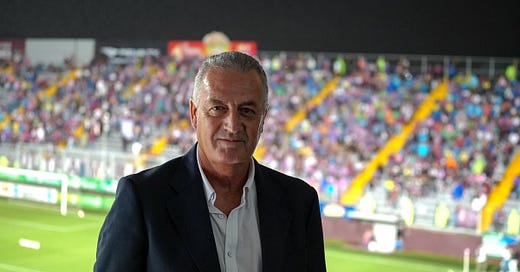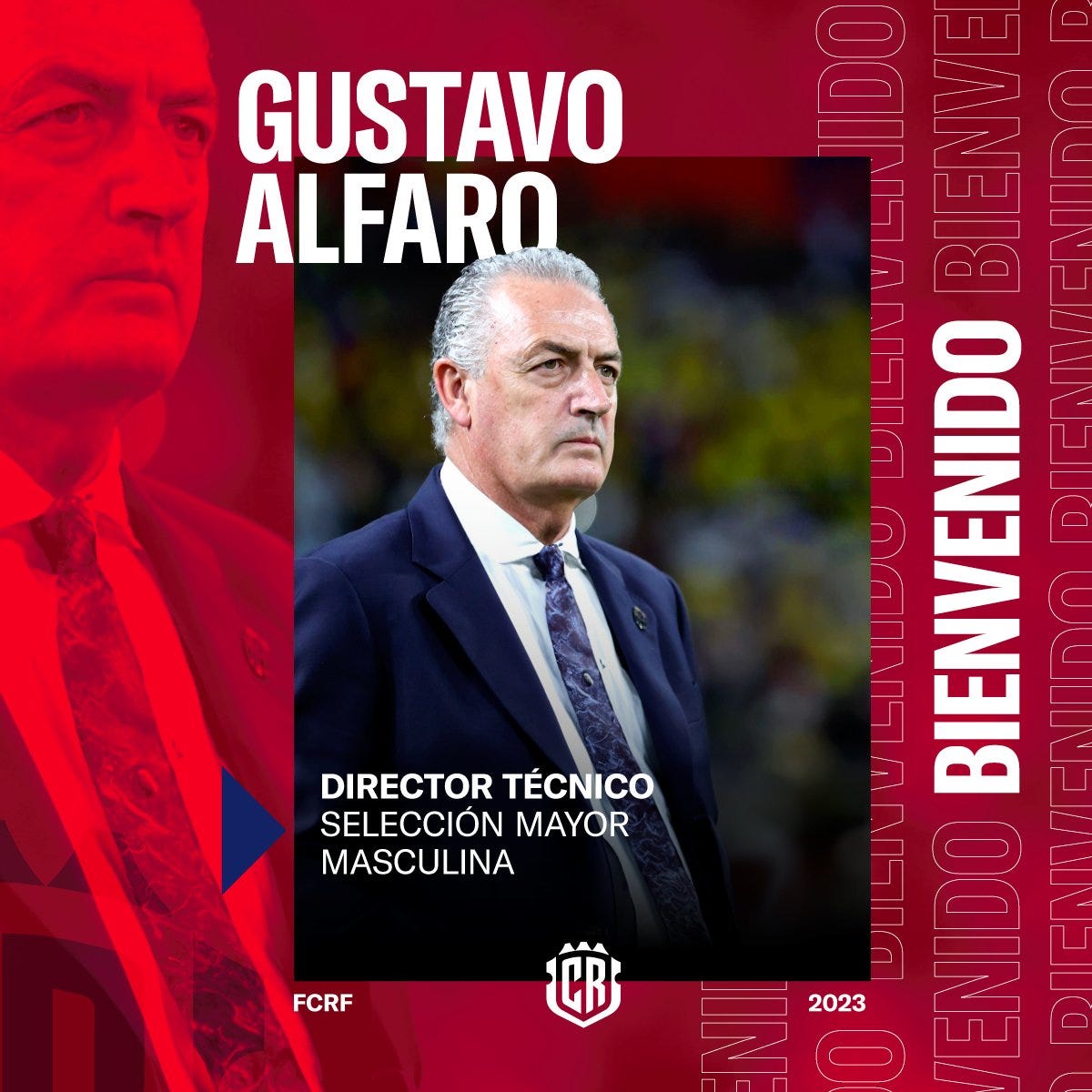🇨🇷 Costa Rica turns to Alfaro needing to reclaim 'third-place status'
Can the former Boca boss put the Ticos back into Concacaf's upper echelon?
For many years, the top two men’s national teams in Concacaf have been obvious. Mexico and the United States win every Gold Cup. They’ve won every Nations League. And, with one quite notable exception, they qualify for every World Cup.
Right behind, though, has been Costa Rica, firmly the third-best team in the region for many years and often (2014’s run in Brazil, qualifying for Russia 2018 over the U.S.) able to make the claim that actually it’s in the top two, thank you very much.
That status has disappeared. The generation of players who spurred that historic run in Brazil has been hanging around, and only when some of them were finally replaced did Costa Rica sneak into the 2022 World Cup. There, embarrassment awaited in the form of a 7-0 loss to Spain, though a subsequent 1-0 win over Japan the last bright moment of a sporting generation.
Since Qatar, the Ticos have been poor, barely advancing to the Gold Cup quarterfinal where they fell to Mexico and floundering in the Nations League.
In 11 matches post-World Cup, the list of teams they have beaten is:
Martinique
Saudi Arabia
Costa Rica now can hardly claim to be the best team in Central America, much less the third-best in Concacaf, having lost their last three competitive meetings against Panama.
Ahead of yet another pair of meetings with the regional rivals, Costa Rica finally has announced a new manager, appointing Gustavo Alfaro three months after firing Luis Fernando Suarez.
Alfaro is a choice that makes a lot of sense for Costa Rica, more sense than many of the names they were linked with during the long search. The qualifications the federation reportedly was looking for were that the coach be foreign and have won something.
While his Copa Sudamericana with Arsenal de Sarandí in 2007 (at the expense of Club América) and Copa Diego Armando Maradona win with Boca Juniors during the pandemic qualifies, his recent experience with Ecuador is more instructive. Ecuador did only slightly better than Costa Rica in Qatar but had a much easier time in qualification despite competing in a more demanding region.
The biggest knock on Alfaro is that he kept the reins on Ecuador’s exciting crop of rising stars. Already, though, he is hinting that he is ready to let Costa Rica’s own up-and-comers run.
“Every idea has to be attached to the reality on the field of play,” he said upon his arrival to Costa Rica.
“We’ve got to agree on that with the players and help them find the structure that’s best for them,” he continued. “Find partnerships, find the right names, the combination of experience and young players so everyone matures and we find a team with an identity that knows what it’s playing for - and quickly is able to excite the fans with what it’s expressing: A defined identity and a team that plays level with any team its facing, on any field.”
There is evidence Alfaro could get more out of Costa Rica’s young players than his predecessor Suarez. For one, Suarez alienated the best of those stars, 21-year-old FC Twente forward Manfred Ugalde.
Even without Ugalde in the squad, many of Costa Rica’s prospects pushed the team in World Cup qualification when given the chance. At the back, coaches are high on goalkeeper Alexandre Lezcano and 23-year-old center back Fernán Faerron has shown signs at Herediano this season he may be turning the corner toward becoming the player scouts expected him to be several years ago - plus 28-year-old Juan Pablo Vargas has several years left to help lead the squad.
In attack, qualification hero Anthony Contreras has landed in Latvia and hit the ground running, potentially setting up for an even bigger jump soon, especially if he keeps teaming well with Joel Campbell for La Sele. Jewison Bennette, still just 19, played in three World Cup matches and is playing with Sunderland’s reserves. Brandon Aguilera is at the same level with Nottingham Forest. Kenneth Vargas has become a regular at Hearts, to the delight of Logan Roy.
Results at the Toulon Tournament, at which Costa Rica exited with no wins in three matches, show there is still work to be done even to refine this promising group.
“Costa Rica has the raw materials. It’s got experience, continuous participation in previous World Cups,” Alfaro said. “I’ll try to take it to another level, always aspiring for the best. I think (Costa Rica) is in a privileged position.”
It is. With the United States, Mexico and Canada hosting the 2026 World Cup and holding automatic bids, plus the expansion of the tournament leading to three additional teams coming from Concacaf’s World Cup qualification competition, this is one time when Costa Rica should be able to walk into the World Cup finals.
Based on its history and its current talent, it should be the top team in WCQ since the North American squads already qualified. Instead, based on recent form, even qualification to the Copa América is far from assured.
Alfaro will have limited time to work with the team ahead of September’s matches against Panama, in which the aggregate winner of the series will lock up a place in the 2024 Copa América. The loser of the tie will play another home-and-home series in March, while the winner will contest the Concacaf Nations League Final Four.
No matter if his team starts, Alfaro has plenty of work to do in a short period of time. It is unlikely Keylor Navas will be available for this month’s matches, with the goalkeeper currently not dressing for PSG because of a back issue. Even when fit, Navas has been selective about which international matches he plays.
That is one veteran you still want on the team.
Alfaro will need to have blunt conversations with others who have long worn the colors with pride but whose best days are behind them.
He will not throw everyone out and start over, saying in an interview days before he took over Costa Rica that every locker room needs one or two players who young players can look to and realize their experience is leading them to the right conclusions. But he also is ready to make tough choices.
“The first step is to kill your passion,” he said in that TNT Sports interview with Israel Damonte, his former player who now manages Colón. “Why? Being a leader you’ll definitely have to make decisions linked with emotional questions and you can’t make emotional decisions. You have to make rational decisions. Because we live by emotion. Soccer is emotion, it’s passion. The only ones who have to be rational are us (managers).”
He also, apparently, will be given the time needed to work. Alfaro will arrive with a six-man coaching staff he selected and with assurances he can look toward next summer and beyond, rather than be judged by what happens against Panama next week.
It may not be listed in his contract, but the goal for Alfaro is clear: Get Costa Rica back to where it’s accustomed to being. Only after reasserting its position as the third-best team in the region can it once again make the case it did in past cycles of being even better.







